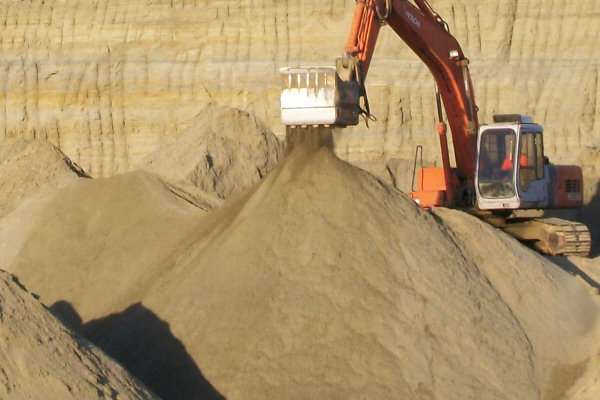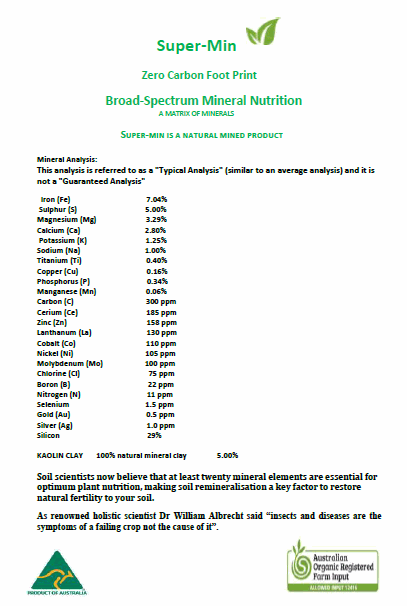What Is Supermin®?
A broad spectrum, mineral rich micro-nutrient fertiliser supporting higher microbial populations in the soil. Supermin® contains trace elements essential to plant growth and soil environment. With Supermin® Formulation, Innovative Nutrients are chemically and physically designed for better availability to plants. The particle size of the Supermin® products are optimum for plant uptake, and the unique formulation helps nutrients avoid soil tie-up and remain plant-available.

WHAT IS PLANT NUTRITION?
Plants use inorganic minerals for nutrition. Complex interactions involving weathering of rock minerals, decaying organic matter, animals, and microbes take place to form inorganic minerals in soil. Roots absorb mineral nutrients as ions in soil water. Many factors influence nutrient uptake for plants. Ions can be readily available to roots or could be "tied up" by other elements or the soil itself if there.


FERTILITY OR NUTRITION
The term "fertility" refers to the inherent capacity of a soil to supply nutrients to plants in adequate amounts and in suitable proportions. The term "nutrition" refers to the interrelated steps by which a living organism assimilates food and uses it for growth and replacement of tissue. Previously, plant growth was thought of in terms of soil fertility or how much fertilizer should be added to increase soil levels of mineral elements. Most fertilisers were formulated to account for deficiencies of mineral elements in the soil.
 The use of soil-less mixes and increased research in nutrient cultures and hydroponics as well as advances in plant tissue analysis have led to a broader understanding of plant nutrition. Plant nutrition is a term that takes into account the interrelationships of mineral elements in the soil or soilless solution as well as their role in plant growth. This interrelationship involves a complex balance of mineral elements essential and beneficial for optimum plant growth.
The use of soil-less mixes and increased research in nutrient cultures and hydroponics as well as advances in plant tissue analysis have led to a broader understanding of plant nutrition. Plant nutrition is a term that takes into account the interrelationships of mineral elements in the soil or soilless solution as well as their role in plant growth. This interrelationship involves a complex balance of mineral elements essential and beneficial for optimum plant growth.
ESSENTIAL VERSUS BENEFICIAL
The term essential mineral element (or mineral nutrient) was proposed by Arnon and Stout (1939). They concluded three criteria must be met for an element to be considered essential. These criteria are: 1. A plant must be unable to complete its life cycle in the absence of the mineral element. 2. The function of the element must not be replaceable by another mineral element. 3. The element must be directly involved in plant metabolism. These criteria are important guidelines for plant nutrition but exclude beneficial mineral elements. Beneficial elements are those that can compensate for toxic effects of other elements or may replace mineral nutrients in some other less specific function such as the maintenance of osmotic pressure. The omission of beneficial nutrients in commercial production could mean that plants are not being grown to their optimum genetic potential but are merely produced at a subsistence level. This discussion of plant nutrition includes both the essential and beneficial mineral elements.
WHAT ARE THE MINERAL ELEMENTS?
There are actually 20 mineral elements necessary or beneficial for plant growth. Carbon (C), hydrogen (H), and oxygen (O) are supplied by air and water. The six macronutrients, nitrogen (N), phosphorus (P), potassium (K), calcium (Ca), magnesium (Mg), and sulphur (S) are required by plants in large amounts. The rest of the elements are required in trace amounts (micronutrients). Essential trace elements include boron (B), chlorine (Cl), copper (Cu), iron (Fe), manganese (Mn), sodium (Na), zinc (Zn), molybdenum (Mo), and nickel (Ni). Beneficial mineral elements include silicon (Si) and cobalt (Co). The beneficial elements have not been deemed essential for all plants but may be essential for some.
The distinction between beneficial and essential is often difficult in the case of some trace elements. Cobalt for instance is essential for nitrogen fixation in legumes. Silicon, deposited in cell walls, has been found to improve heat and drought tolerance and increase resistance to insects and fungal infections. Silicon, acting as a beneficial element, can help compensate for toxic levels of manganese, iron, phosphorus and aluminium as well as zinc deficiency. A more holistic approach to plant nutrition would not be limited to nutrients essential to survival but would include mineral elements at levels beneficial for optimum growth.
With developments in analytical chemistry and the ability to eliminate contaminants in nutrient cultures, the list of essential elements may well increase in the future.

